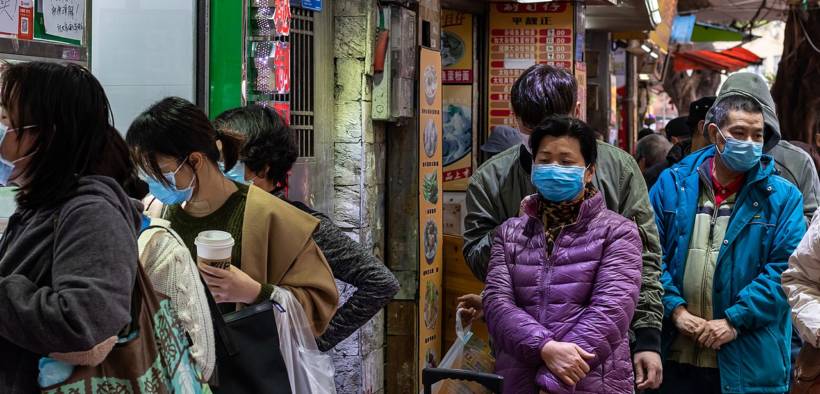Internal Chinese Memo Details COVID-Related Geopolitical Repercussions for Beijing

Reuters was informed on Monday of an internal report circulated within the upper echelons of Beijing that describes the geopolitical repercussions China may face from the COVID-19 pandemic.
Reuters was informed on Monday of an internal report circulated within the upper echelons of Beijing that describes the geopolitical repercussions to China from COVID-19. Notably, the bulletin pegs anti-China sentiment at a peak comparable to the climate following the Tiananmen Square Massacre in 1989.
Although Reuters did not receive a leaked transcript of the memo, its contents were conveyed to the news organization by people how had laid eyes on it. The report originated with the Chinese Ministry of State Security and was shared with government officials including President Xi Jinping, Reuters reported.
Economic and Security Backlash Follows Virus
The report argues that China’s Belt and Road Initiative could be disrupted. The economic undertaking encapsulates most of the Middle East and Asian states and consequently requires their cooperation. Due to allegations about Beijing’s handling of the virus — that Beijing reacted too slowly at raising the alarm on the coronavirus, it’s refusal to work with international investigators, or worse, the unsubstantiated claim that the virus was concocted in a Wuhan laboratory — other governments and even private enterprises may be reluctant to do business with China.
In terms of national security, the report warns that the US could bolster its military ties to allies within the region. The South China Sea has long been a contentious issue between Beijing and Western powers, which support bordering states such Vietnam, the Philippines, and Taiwan.
The US has already increased its presence in the disputed waters during the pandemic as a response to Chinese aggression. Although the Chinese report paints the scenario as one whereby the US is the aggressor, American researchers view it differently, The New York Times reported.
“It seems that even as China was fighting a disease outbreak, it was also thinking in terms of its long-term strategic goals,” said Professor Alexander Vuving at the Daniel K. Inouye Asia-Pacific Center for Security Studies in Honolulu. “The Chinese want to create a new normal in the South China Sea, where they are in charge, and to do that they’ve become more and more aggressive.”
In March, Beijing inaugurated two research stations in the South China Sea on artificial reefs. Beijing also announced the establishment of a pair of districts in the sea in an attempt to force others out. The COVID-19 pandemic could compel the US to take a more aggressive stance. Furthermore, the international community might finally decide to take a collective action against Beijing that would threaten its territorial ambitions.
“Drop the f***ing hammer.”
Other consequences that could come as a result of China’s alleged role in the spread of the virus could be more economic in nature. Shortly before COVID-19 became a pandemic, Washington and Beijing agreed upon a Phase One trade agreement. Now, the Trump administration is looking at options for punishing China, an idea that could throw off a short-lived respite from the US–China trade war.
Although Deputy National Security Adviser Matthew Pottinger said “The US isn’t looking a punitive measures here,” Secretary of State Mike Pompeo and Treasury Secretary Steven Mnuchin indicate otherwise.
Trump has maintained that China had a role in furthering the virus’ spread, according to POLITICO.
“I don’t think there’s any question about it,” Trump said on Sunday.
Following a Department of Homeland Security report that implicated China in withholding vital information in order to hoard personal protective gear, Secretary of State Mike Pompeo said he was “very confident that the Chinese Communist Party will pay a price for what they did here, certainly from the United States.”
Mnuchin said his boss “is reviewing all these issues, very, very carefully” to discern the next steps in dealing with China.
“In my personal opinion, we should drop the f***ing hammer on them. Stop being such p***ies,” a senior White House official told Vox’ Alex Ward, speaking anonymously
On Thursday, another senior adviser told the Washington Post, “Punishing China is definitely where the president’s head is at right now.”
Early ideas floated around Washington include removing China’s sovereign immunity, giving victims ability to sue Beijing, and cancelling US debt, which is over $1 trillion. Trump added his go-to economic arsenal — tariffs — to the list of options on Thursday.
The US isn’t alone in pressuring China. German Foreign Minister Heiko Mass echoed American calls for investigation transparency, Newsweek reported.
“The whole world wants the exact origin of the virus to be clarified,” Maas said, adding that China’s response will show “how transparent it wants to be with the virus.”
Similarly, EU Commission President Ursula von der Leyen formally asked Beijing for an “international probe of COVID-19’s origins.”
Relocating Businesses
In a bid to prevent a manufacturing halt again, and to reduce reliance on China, the US has joined Australia, New Zealand, South Korea, Japan, and India to relocate material sourcing and manufacturing, Reuters reported. According to Pompeo, it would “move the global economy forward.”
“We’ve been working on [reducing the reliance of our supply chains in China] over the last few years but we are now turbo-charging that initiative,” said Keith Krach, undersecretary for Economic Growth, Energy and the Environment at the US State Department.
The idea is known as the Economic Prosperity Network, according to one Washington official. Moving businesses out of China, which already happened to a lesser extent during the trade war, would allow companies to avoid tariffs and free Trump to levy new and harsher penalties on Beijing exports.
Krach told Reuters that the idea is being prioritized by the Trump administration and an announcement could be forthcoming with more details.















